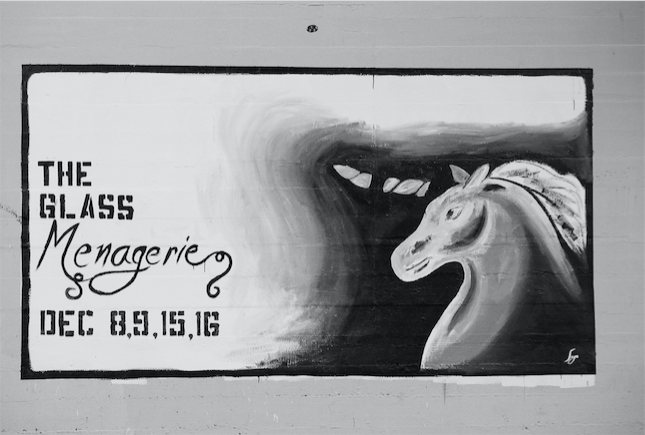Photograph by Simone Lewis
The Glass Menagerie, when first written, was going to be called The Gentleman Caller. The plot is centered around the family of Amanda, a mother born into wealth but now struggling to make ends meet during the Great Depression. She attempts to set up her daughter Laura, who is isolated and disconnected from reality, with a “gentleman caller.” The play is narrated by Tom, Amanda’s other child. He provides for the family through working at a shoe factory, which he does not enjoy and escapes from through going to the movies nightly.
The two acts of the play each have distinctly different feels to them. The first act introduces the family and develops their characters. The dynamic between the family is well developed and interesting, worthy of more than just one act of focus.
The first act deals heavily with how the characters react to the challenges and labor they face throughout their difficult lives. Each character tries to escape from constant struggle faced with little rewards. Although the play is set in the 1930s, escape from the drudgery of life is still very relatable in the modern age, and gives the play universality and relevance.
Do they just stop trying and give up, as Laura does? Do they attempt to find meaning in it, like Amanda? Do they grit their teeth and slog through it, but stay bitter and angry at their work throughout, like Tom? These challenges are universally relatable to most students.
The second act is more focused on the gentleman caller and his romance with Laura. It also explores Laura’s insecurity, another common experience. While early on the romance can seem hackneyed and cliche, these tropes are subverted wrenchingly and the romance is anything but typical. Besides, the cliches are used well enough to tug at your heartstrings. The gentleman caller fits well into the family dynamic and moves the show forward effectively.
The play does, on occasion, suffer from slight overacting. Especially early in the show with the lines intended to be comedic, the actors deliver their lines with more levity and energy than fits the solemn tone of the show, breaking the immersion of the audience and taking away from the effect of the dialogue. But this is nitpicking. Most of the time, the acting in this show is phenomenal.
The true heart of this show is its dialogue. Every line crackles with either emotional power or comedic brilliance. Tennessee Williams has been thought of as one of the greatest playwrights in American history, and this show confirms it.
Although the play opens with a monologue on the state of America in the 1930s, it wisely shies away from political or social issues and instead keeps its focus tightly focused on the family and their peculiar dynamic.
With only four actors, the cast of the show is kept minimal. This allows the show to be well focused on the characters and dialogue. Nothing in The Glass Menagerie is unnecessary or superfluous. Everything fits very well into the broader theme of the play.
This was an incredible and moving show. It touches on universal themes about insecurity and finding meaning in work. I recommend that anyone with the ability go and see it. In a world of constant drudgery, this play can provide a meaningful and enlightening escape.


